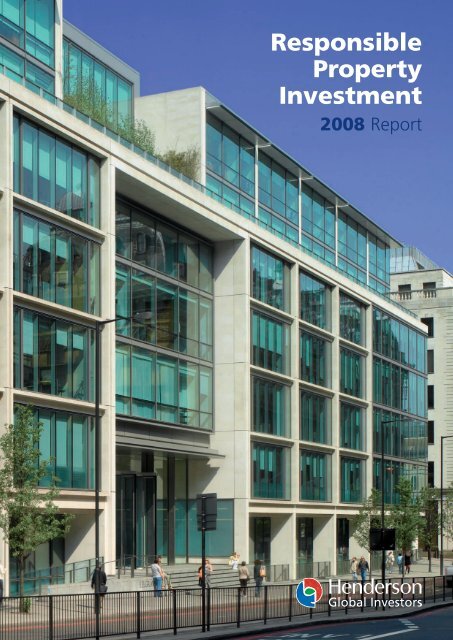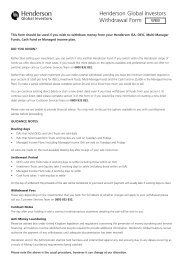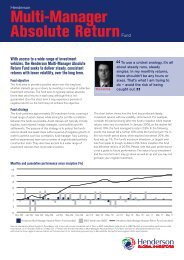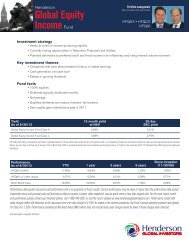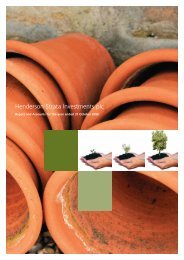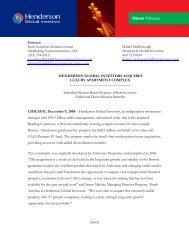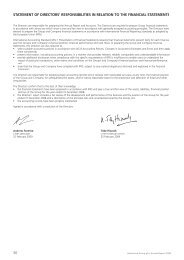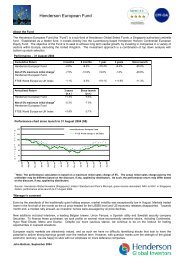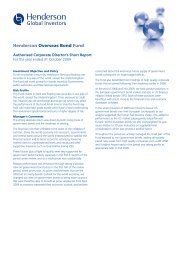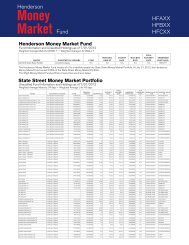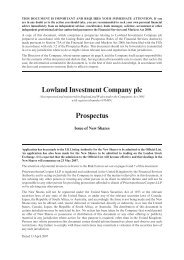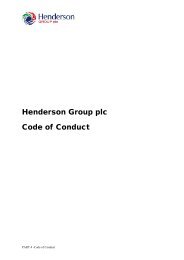Responsible Property Investment 2008 - Henderson Global Investors
Responsible Property Investment 2008 - Henderson Global Investors
Responsible Property Investment 2008 - Henderson Global Investors
You also want an ePaper? Increase the reach of your titles
YUMPU automatically turns print PDFs into web optimized ePapers that Google loves.
1<br />
<strong>Responsible</strong><br />
<strong>Property</strong><br />
<strong>Investment</strong><br />
<strong>2008</strong> Report
<strong>2008</strong> report <strong>Responsible</strong> <strong>Property</strong> <strong>Investment</strong><br />
2<br />
Contents<br />
Managing Director’s Statement 2<br />
<strong>Responsible</strong> <strong>Property</strong> <strong>Investment</strong> at <strong>Henderson</strong> 3<br />
Sustainability Portfolio Analysis 4<br />
<strong>Responsible</strong> <strong>Property</strong> Management 6<br />
<strong>Responsible</strong> <strong>Property</strong> Development 8<br />
What’s Next? 9<br />
<strong>2008</strong> Target Update 10<br />
2009 Targets 11<br />
Advisor’s Statement 11<br />
“Doing Well by Doing Good”<br />
When asked to sum up why <strong>Responsible</strong> <strong>Property</strong><br />
<strong>Investment</strong> (RPI) is so important to <strong>Henderson</strong>’s property<br />
business, I often refer to the maxim “doing well by doing<br />
good”. This is because we have reached the inescapable<br />
conclusion that by acting in a way that is beneficial to<br />
the environment and community, we can better protect<br />
or perhaps even enhance the returns to our investors<br />
over the long term.<br />
It therefore gives me great pleasure to introduce our first<br />
annual RPI report and I trust the pages that follow will highlight the considerable progress we have made<br />
over the last year. Indeed, <strong>Henderson</strong>’s property business now works towards a clearly defined RPI policy<br />
and objectives, within a strategic operational and reporting framework. This will help us to manage and<br />
develop our assets in a way that minimises their adverse social and environmental impacts.<br />
At a detailed level, our approach has been to undertake a comprehensive sustainability audit of every<br />
property in eight of our UK portfolios representing 161 properties with a combined value in excess of<br />
£3.3 billion*. The results of this assessment underpin a sustainability risk management strategy for each<br />
participating fund, which details the specific challenges and opportunities for that fund. Our RPI<br />
philosophy is based on continuous improvement and we will use future editions of this report to inform<br />
you of the progress we are making.<br />
Finally, I would like to leave you with the reassurance that we are not about to rest on our laurels. Our<br />
RPI team is currently looking to increase the number of UK assets participating in the framework. In<br />
addition, we are about to embark on a trial assessment of a sample of our assets in France, extending<br />
the reach of the initiative to our pan-European property portfolio.<br />
In recognition of the importance of transparency and communication with all our stakeholders, I hope<br />
that you find this first annual RPI report illuminating and would welcome any feedback you might have.<br />
Best wishes<br />
James Darkins, Managing Director, <strong>Global</strong> <strong>Property</strong><br />
*As at end December <strong>2008</strong><br />
Cover photo: Belgrave House, <strong>Henderson</strong> Central London Office Fund
<strong>Responsible</strong> <strong>Property</strong> <strong>Investment</strong> at <strong>Henderson</strong><br />
ADDRESSING RISKS AND IDENTIFYING OPPORTUNITIES FOR LONG-TERM VALUE CREATION<br />
We consider the good management of our<br />
environmental and social impacts to be central to our<br />
future success. Our holistic approach enables us to<br />
assess key risks and opportunities in areas that may be<br />
overlooked by short-term real estate investment<br />
strategies and helps us to anticipate changes in<br />
occupier demand, climate, energy supply, the<br />
investment market, legislative and fiscal regimes.<br />
We believe that the sustainability performance of our<br />
property portfolio will impact on operational costs, asset<br />
values, obsolescence and rental growth as well as occupier<br />
wellbeing, community regeneration and climate change<br />
adaptation and mitigation. RPI helps us to better address<br />
these issues through strategic risk management and to<br />
identify opportunities to create value for all our stakeholders.<br />
The Head of <strong>Global</strong> <strong>Property</strong> <strong>Investment</strong> assumes specific<br />
responsibility for RPI issues and is supported by the Head of<br />
<strong>Responsible</strong> <strong>Property</strong> <strong>Investment</strong>, who co-ordinates and<br />
promotes the implementation of our policy throughout<br />
<strong>Henderson</strong>’s property division. The RPI Steering Committee<br />
meets regularly to monitor progress, while the RPI initiative<br />
is supported by our managing agents, joint venture partners<br />
and sustainability advisors.<br />
To ensure that RPI is integrated into all aspects of our property<br />
investment, development and management activities, we<br />
have established the following governance framework:<br />
We have taken a significant step forward in <strong>2008</strong> and are determined to embed<br />
sustainability into the heart of our property investment processes. We hope that in<br />
implementing our RPI policy and strategy we will be better able to protect and<br />
enhance the value of our assets, while responding positively as a business to the<br />
challenges posed by climate change<br />
Andy Schofield, Head of <strong>Responsible</strong> <strong>Property</strong> <strong>Investment</strong><br />
<strong>2008</strong> report <strong>Responsible</strong> <strong>Property</strong> <strong>Investment</strong><br />
3
<strong>2008</strong> report <strong>Responsible</strong> <strong>Property</strong> <strong>Investment</strong><br />
4<br />
<strong>Henderson</strong>’s Sustainability Portfolio Analysis<br />
ASSESSING THE SUSTAINABILITY PERFORMANCE AND RISK EXPOSURE OF OUR PORTFOLIO<br />
Our major endeavour in <strong>2008</strong> was to undertake a<br />
detailed survey of all the environmental and socioeconomic<br />
features of the properties in eight of our<br />
funds and assess their exposure to sustainabilityrelated<br />
risks.<br />
We developed and carried out an extensive Sustainability<br />
Portfolio Analysis (SPA), enabling us to identify areas of risk<br />
and opportunity at both a property and fund level. We now<br />
have risk profiles for each fund and detailed property<br />
improvement plans, which will inform our fund strategies<br />
for 2009.<br />
• 161 properties took part, each answering 78<br />
questions contained in the <strong>Henderson</strong> SPA audit<br />
• 97% of the properties (156 sites) were visited<br />
and assessed during the process<br />
Risk Mapping and Benchmarking<br />
Alongside the SPA process, <strong>Henderson</strong> took part in Upstream<br />
Sustainability Services’ The Third Dimension for the third<br />
consecutive year. As well as contributing to industry research<br />
into the link between sustainability and investment<br />
performance, this enabled us to compare the sustainability<br />
risk exposure of our funds to that of the <strong>2008</strong> syndicate of<br />
12 major property investors comprising 1500 properties. 45<br />
funds took part in the benchmarking, whereby five out of<br />
eight <strong>Henderson</strong> funds demonstrated above-average<br />
sustainability performance:<br />
Total Weighted Sustainability Score<br />
80%<br />
70%<br />
60%<br />
50%<br />
40%<br />
30%<br />
20%<br />
10%<br />
0%<br />
<strong>Henderson</strong> Funds<br />
The Third Dimension Syndicate Funds<br />
SPA - Environment<br />
We believe that it is our responsibility to reduce our carbon<br />
footprint and manage those impacts which contribute to<br />
climate change, as well as ensuring that our property<br />
portfolio is capable of adapting to predicted changes in<br />
weather patterns such as heavier rain, increased flooding,<br />
hotter summers and drought. Financial considerations such<br />
as rising energy costs and landfill tax have also encouraged<br />
us to address utilities consumption and waste management.<br />
Other key climate change and environmental issues<br />
examined through SPA included pollution, biodiversity,<br />
weathering, transport, hazardous waste, passive design,<br />
water use and renewables.<br />
Environmental topics comprised a significant proportion of<br />
our questionnaire and we now have a comprehensive<br />
picture of the activities and features already in place across<br />
our portfolio. SPA has also identified those properties at<br />
highest risk and with greatest potential for improvement, so<br />
we can work together with our property managers to<br />
concentrate our efforts on those key areas.<br />
• 21% of our multi-let properties provide recycling<br />
facilities for the tenants<br />
• 69% of our multi-let properties are undertaking<br />
energy reduction measures<br />
• 45% of the properties analysed encourage cycling<br />
Risk can arise from three broad sources:<br />
• Legislative – risks that arise from liabilities under<br />
current and forthcoming legislation such as the<br />
UK Climate Change Act, Carbon Reduction<br />
Commitment and European Performance of<br />
Buildings Directive, which could lead to increased<br />
obsolescence and greater financial burden.<br />
• Operational – risks that can potentially affect a<br />
building’s ability to operate effectively in the<br />
changing market and climate, using resources<br />
efficiently whilst attracting, retaining and<br />
providing comfort for occupiers.<br />
• Reputational – risks encompassing the<br />
reputational consequences for a landlord or<br />
particular property of a well-publicised<br />
environmental or social incident, which could<br />
affect <strong>Henderson</strong>’s aim to be a landlord of choice<br />
for occupiers and investors.<br />
SPA has helped us to establish which of our assets need our special attention so that,<br />
with the help of our property managers, our funds can work towards generating<br />
optimal performance combined with a strong sustainability profile<br />
Ainslie McLennan, Director of <strong>Property</strong> and Fund Manager
SPA - Society<br />
We want to be more conscious of our role in the<br />
communities surrounding our assets and for our occupiers<br />
and visitors to enjoy a safe and productive environment. To<br />
ensure that we fulfil these objectives in the future, the SPA<br />
assessed the position of each asset with regards to a number<br />
of social issues such as accessibility, crime and security,<br />
community engagement, health & safety, public transport<br />
provision, procurement and occupier interaction.<br />
• 70% of our multi-let properties have had a DDA<br />
Audit or Update in the last 5 years<br />
• 91% of our multi-let properties are taking<br />
measures to promote crime reduction on site<br />
• 56% of our multi-let properties request contract<br />
tenders and procure services from local firms<br />
SPA - Economy<br />
Our broad view of sustainability seeks to encompass the<br />
inter-relationship with economies that are local to our assets,<br />
in addition to the indirect impacts through our supply chains.<br />
As a business, we are accountable to our investors and<br />
therefore need to ensure that our properties have a robust<br />
environmental and social performance coupled with a stable<br />
income stream. The SPA examined occupier lease terms,<br />
interaction with the local economy, rent and service charges<br />
in order to assess where we need to reinforce this triple<br />
relationship.<br />
Implementing SPA<br />
The SPA provided us with a unique opportunity to engage on<br />
a large scale with our property managers on RPI matters. We<br />
recognise that working together with our partners is the<br />
most effective way to fully address our impacts and achieve<br />
our targets. Expanding this engagement process will be a key<br />
focus for us in 2009.<br />
Taken together, The Third Dimension and the SPA have<br />
furnished <strong>Henderson</strong> with a sophisticated and granular<br />
understanding of the sustainability profile of our portfolios,<br />
from fund to property level. We intend to use this<br />
information to inform our risk and asset management, to<br />
ensure that our portfolio is future-proofed as far as possible.<br />
The results of the SPA process provide a framework for fund and asset level strategies.<br />
In addition to achieving our sustainability objectives, we expect this to provide<br />
opportunities for active asset management<br />
Clive Castle, Director of <strong>Property</strong> and Fund Manager<br />
Following its recent refurbishment, 133 Houndsditch in the <strong>Henderson</strong> Central London Office Fund received one of the<br />
highest sustainability scores in the SPA<br />
<strong>2008</strong> report <strong>Responsible</strong> <strong>Property</strong> <strong>Investment</strong><br />
5
<strong>2008</strong> report <strong>Responsible</strong> <strong>Property</strong> <strong>Investment</strong><br />
6<br />
<strong>Responsible</strong> <strong>Property</strong> Management<br />
DELIVERING RPI ON THE GROUND WITH OUR PROPERTY MANAGEMENT TEAMS<br />
Engaging our property managers is central to the<br />
success of our RPI programme, particularly around the<br />
three key areas of energy, water and waste<br />
management.<br />
In <strong>2008</strong>, we initiated data collection across our property<br />
portfolios. Measurement of sustainability performance<br />
represents one of the key challenges to the property sector,<br />
as evidenced by the growing number of industry-wide<br />
initiatives on sustainability performance measurement and<br />
reporting. We want to ensure that next year we are able to<br />
report to our stakeholders on our performance regarding key<br />
indicators such as carbon emissions and recycling rates. Our<br />
properties now regularly submit their energy and waste data,<br />
enabling us to establish the <strong>2008</strong> baseline against which we<br />
will be reporting annually.<br />
Our vision of a sustainably managed building is not limited to<br />
addressing its environmental impacts; we also have a<br />
number of successful community initiatives in place and we<br />
are looking to assist our funds in sharing this good practice<br />
to increase the number of properties taking part in these<br />
activities.<br />
Energy efficient lighting at the Bullring<br />
The Bullring, an iconic building in the centre of Birmingham,<br />
installed an energy efficient lighting system in summer <strong>2008</strong>.<br />
In partnership with Philips Solid State Lighting Solutions, the<br />
Bullring, Weblight and Mitie have undertaken the<br />
replacement of the original cold cathode decorative lighting<br />
scheme with a state-of-the-art LED solution. This approach is<br />
expected to save:<br />
• 85% of the energy needed to illuminate the<br />
centre<br />
• £34,000 in annual running costs<br />
• Some 250 tonnes of CO2 emissions annually<br />
In addition to the impressive energy savings, the new LED<br />
system brings a whole host of creative lighting displays<br />
which shoppers and visitors to the centre can enjoy.<br />
Selecting LEDs has enabled us to enhance the<br />
Bullring’s aesthetics and visual impact as well as<br />
reducing our environmental impact<br />
Tim Walley, General Manager, Bullring<br />
We know it will be a long journey to embed sustainability at the heart of our<br />
property management and to be able to robustly measure the impact of our<br />
initiatives in these areas. However, we are optimistic that our property management<br />
teams and occupiers will help us to implement our strategy over the next year<br />
Jason Boyce, Portfolio Manager<br />
Whitefriars Shopping Centre, a centre of excellence in environmental performance and community work
Waste management at The Brewery<br />
The Brewery’s waste management changed dramatically in<br />
<strong>2008</strong>. The retail park’s centre management now views waste<br />
as a potential resource and salvages cardboard, plastics, paper,<br />
cans, glass and bottles. Every measure is taken to reduce the<br />
amount of waste going to landfill and the Centre is exploring<br />
‘waste to energy’ options for residual waste. A clothes and<br />
shoe bank has also been introduced in the car park area.<br />
Portfolio Manager, Adam Stone, and the property<br />
management team accept the ‘Green Apple’ award at the<br />
House of Commons<br />
At monthly tenants’ meetings The Brewery management<br />
team works closely with staff and tenants on implementing<br />
the retail park’s Green Business Plan. The response to this<br />
initiative has been overwhelming.<br />
The property management team’s achievements at The<br />
Brewery gained recognition through the International Green<br />
Apple Awards, presented in the House of Commons by The<br />
Green Organisation.<br />
The Brewery are helping to preserve and protect<br />
the environment and all our new recycling on site<br />
has made a positive contribution<br />
Ian Forster, General Manager, Esporta<br />
Providing local employment opportunities<br />
The Academy @ St James Shopping Centre in Edinburgh was<br />
officially opened in March <strong>2008</strong>. It is working to train young<br />
people and provide retailers within St James Shopping,<br />
Multrees Walk and throughout the city centre with fully<br />
prepared, high calibre candidates for job vacancies. One of<br />
the units in St James was offered rent free as the ‘hub’ of the<br />
Academy and <strong>Henderson</strong> contributed a further £5,000<br />
towards the fit-out of the unit.<br />
• In the first 12 months, 1,182 young people<br />
enrolled to the Academy @ St James<br />
The Retail Academy at Buchanan Galleries, another initiative<br />
within the <strong>Henderson</strong> Shopping Centre Fund, is operated by<br />
Glasgow North Regeneration Company and delivers six week<br />
retail skills programmes. These offer intensive training and<br />
work experience to participants, providing a pool of<br />
customer focused, commercially aware staff to employers. In<br />
addition, the Academy has delivered six two-day customer<br />
service programmes for Buchanan Galleries with over 60<br />
employees participating.<br />
• Six full programmes have been delivered at<br />
Buchanan Galleries, with 85% of participants<br />
achieving employment or qualifications as a result<br />
The Academy is an exciting partnership approach to<br />
improving access to employment and training,<br />
increasing the pool of potential recruits with the<br />
skills, experience and abilities to meet specific<br />
recruitment needs<br />
Councillor Tom Buchanan, the City of Edinburgh Council's<br />
economic development leader<br />
Occupier engagement was key to The Brewery's success in introducing extensive recycling and water-saving features across<br />
the retail park<br />
<strong>2008</strong> report <strong>Responsible</strong> <strong>Property</strong> <strong>Investment</strong><br />
7
<strong>2008</strong> report <strong>Responsible</strong> <strong>Property</strong> <strong>Investment</strong><br />
8<br />
<strong>Responsible</strong> <strong>Property</strong> Development<br />
INTEGRATING SUSTAINABILITY INTO THE HEART OF OUR DEVELOPMENT PROCESS<br />
<strong>Henderson</strong>’s RPI policy relates to all facets of the<br />
investment process including transactions, management<br />
and development. However, we believe the complexities<br />
and potential impacts of our development and<br />
refurbishment activities warrant a dedicated <strong>Responsible</strong><br />
<strong>Property</strong> Development (RPD) strategy.<br />
Following consultation with our project teams and partners, we<br />
published an RPD Policy enshrining our approach to reducing<br />
environmental impacts and maximising the socio-economic<br />
contributions of our development projects. We have set a<br />
number of stretching targets with regards to energy, flooding,<br />
water, ecology, waste, community, procurement and transport,<br />
which will be applied to all development projects from 2009 to<br />
2011.<br />
We believe that this three-year target period will give us<br />
sufficient time to practically consider and implement the<br />
necessary changes at both strategic and project level. Key<br />
Performance Indicators have been set, several of which have<br />
been translated into contractual requirements to ensure that all<br />
parties in the development project teams collaborate and assist<br />
with achieving our objectives.<br />
RPD Checklist<br />
An important step towards delivering our RPD commitments<br />
was the development of an RPD checklist and guidance note.<br />
The checklist is designed for use both on new developments<br />
and major refurbishments, and incorporates all project phases<br />
from land acquisition through design and planning to fit-out<br />
and post practical completion. The checklist will encourage<br />
the project team to undertake all the necessary steps to fulfil<br />
each RPD target, monitoring progress and highlighting key<br />
areas to be addressed. A guidance note accompanies the<br />
checklist giving recommendations of good practice and linking<br />
to relevant documentation and sources of further information.<br />
RPD in practice<br />
Our major city centre redevelopment of the St James Quarter<br />
in Edinburgh will be carried out in accordance with our RPD<br />
Policy. We have recently completed a two year consultation<br />
process with the City of Edinburgh Council, the community<br />
and local business leaders to receive outline planning consent<br />
for our mixed-use design featuring retail, hotel, restaurants,<br />
leisure facilities and housing. The project offers us a fantastic<br />
opportunity to put our checklist to the test and to translate<br />
our RPD objectives into practice.<br />
This year we have put a lot of thought into our responsible property development<br />
approach, exploring what it really means on the ground and how we can work<br />
together with our partners to overcome the practical challenges of constructing<br />
more sustainable properties and places<br />
We are very pleased to have developed a user-friendly interactive checklist to ensure<br />
that we do this in a consistent and robust way<br />
Colin Palmer, Director of <strong>Property</strong>, Development Management (Europe)<br />
Sustainability is a priority in the design and construction of the St James Quarter, Edinburgh
What’s Next?<br />
REPORTING OUR ACHIEVEMENTS AND EXPANDING OUR RPI PROGRAMME<br />
Following the <strong>2008</strong> Sustainability Portfolio Analysis, we<br />
now have a comprehensive picture of the key areas for<br />
improvement across our funds. SPA has identified<br />
inherent risks that we will address by integrating<br />
sustainability assessment into our asset allocation and<br />
investment decision-making procedures. The SPA fundlevel<br />
and property-specific recommendations will enable<br />
us to direct our efforts towards the necessary initiatives<br />
that we will put in place through engagement with our<br />
managing agents and occupiers in 2009.<br />
Occupier engagement<br />
A key focus for 2009 will be an extensive programme of<br />
occupier engagement. An important finding of the SPA was<br />
that, in order to maximise opportunities for improving<br />
sustainability performance at our properties, it is imperative<br />
that we work together with our managing agents and<br />
occupiers. This will help us to ensure all parties are working<br />
towards the same goals and sharing good practice.<br />
Widening the SPA net<br />
We are expanding the SPA to our non-UK assets with a trial<br />
assessment of a sample of our French properties. We are also<br />
planning to undertake a detailed sustainability analysis of our<br />
newly acquired fund New Star UK <strong>Property</strong> Unit Trust, to<br />
ensure it is fully incorporated into our RPI programme.<br />
Data gathering and reporting<br />
In 2009 we plan to make our energy, water and waste data<br />
gathering processes more accurate and easier for our<br />
managing agents to undertake. The regular collection of<br />
performance data allows us to identify problems and<br />
anomalies as quickly as possible. It will also enable us to<br />
accurately monitor our performance in comparison to our<br />
<strong>2008</strong> baseline and against our 2009 targets. We look<br />
forward to reporting more quantitative measurement data<br />
in next year’s annual report.<br />
Benchmarking<br />
To enable us to track and rank progress against our peers,<br />
we will enter 20 of our properties into Upstream<br />
Sustainability Services’ Operational Performance<br />
Benchmarking. This will help us to make better informed<br />
management choices by identifying areas of over and underperformance<br />
and comparing these against established<br />
benchmarks and sustainability indicators.<br />
I look forward to overseeing the expansion of our programme over the coming year.<br />
Our targeted approach is particularly important given the current economic<br />
circumstances, where it would not be justifiable for us to dedicate time and<br />
resources to an RPI programme that was not explicitly focused on protecting and<br />
enhancing value<br />
Mike Sales, Head of <strong>Global</strong> <strong>Property</strong> <strong>Investment</strong><br />
<strong>Henderson</strong>'s assets in the Paris region are next in line to take part in the SPA<br />
<strong>2008</strong> report <strong>Responsible</strong> <strong>Property</strong> <strong>Investment</strong><br />
9
<strong>2008</strong> report <strong>Responsible</strong> <strong>Property</strong> <strong>Investment</strong><br />
10<br />
<strong>2008</strong> Target Update<br />
REPORTING OUR PROGRESS AGAINST HEADLINE OBJECTIVES<br />
We set ourselves a large number of challenging management targets in <strong>2008</strong> and worked together with our<br />
property management teams and sustainability advisors throughout the year towards achieving them. Due to<br />
the extensive scope of the targets, the completion of many of them is still in progress and this has informed our<br />
more streamlined target-setting process for 2009.<br />
Governance and Strategy<br />
Establish an internal governance process to ensure that our strategy is effectively implemented<br />
Set specific objectives, targets and key performance indicators with defined responsibilities, and review our progress<br />
towards these on a regular basis<br />
Develop employee RPI training programmes and incorporate RPI responsibilities into job descriptions<br />
<strong>Property</strong> Transactions<br />
Integrate sustainability issues into standard risk assessment and due diligence procedures<br />
Integrate RPI considerations into transaction decisions<br />
Portfolio Management<br />
Complete a detailed analysis of the specific sustainability risks associated with the property types and individual<br />
properties that we invest in<br />
Engage with all property managers in order that they can successfully deliver our RPI strategy<br />
Measure the performance of all property managers against our RPI strategy<br />
Engage with all of our tenants regarding the objectives of our RPI strategy<br />
Ensure that tenants have due regard to our RPI strategy when granting approval for proposed improvements<br />
and/or refurbishments<br />
Conduct research into occupier demand preferences for facilities and services<br />
Engage with our investment partners to encourage the implementation of our RPI strategy for those properties where<br />
we do not have direct management control<br />
Measure and reduce energy consumption within landlord controlled areas at our properties<br />
Commence the assessment of the energy performance of our directly managed properties in advance of the<br />
introduction of EPCs<br />
Measure and reduce water consumption within landlord controlled areas at our properties<br />
Measure and reduce landlord controlled waste production at our properties<br />
Measure and increase waste recycling at our properties<br />
Implement a 'green travel plan' at selected properties<br />
Ensure that all our properties are DDA compliant<br />
Develop employment opportunities within the local community<br />
Take measurable steps to provide safe and secure local environments around our properties<br />
Completed<br />
In progress<br />
Not completed
2009 Targets<br />
ALL TARGETS ARE ANNUAL FOR 2009, EXCEPT WHERE OTHERWISE STATED<br />
Energy: Reduce landlord-controlled CO2 emissions by 5%<br />
against the <strong>2008</strong> baseline, by the end of 2010<br />
Water: Reduce water consumption within landlordcontrolled<br />
areas by 5% against the <strong>2008</strong> baseline, by the<br />
end of 2010<br />
Waste: Reduce the amount of landlord-controlled waste<br />
sent directly to landfill by 15% from the <strong>2008</strong> baseline, by<br />
the end of 2010<br />
Benchmarking our performance: Take part in an industry<br />
recognised benchmark to measure the sustainability<br />
performance of our properties<br />
Implementing SPA: Address the risks and opportunities<br />
identified by our <strong>2008</strong> Sustainability Portfolio Analysis by<br />
implementing the fund-level recommendations and setting<br />
fund-specific targets<br />
Advisor’s statement<br />
Upstream Sustainability Services has been supporting<br />
<strong>Henderson</strong> <strong>Property</strong> with its <strong>Responsible</strong> <strong>Property</strong><br />
<strong>Investment</strong> approach since July 2007.<br />
Our close engagement with the Head of RPI and regular<br />
attendance at meetings with <strong>Henderson</strong>’s RPI Committee,<br />
fund managers and managing agents has enabled us to<br />
provide a well-informed external view of the progress<br />
<strong>Henderson</strong> has made to date in achieving their targets and<br />
embedding sustainability into their operations. However, due<br />
to the nature of our involvement in delivering part of the RPI<br />
commitments, including the <strong>2008</strong> SPA process, this<br />
statement should not be read as fully independent assurance<br />
of the information in this report.<br />
Due to the large number of RPI targets that <strong>Henderson</strong> set<br />
themselves for the first time in <strong>2008</strong>, 66% of them have<br />
been assessed as ‘in progress’ at the end of the year, and<br />
work towards two targets has not yet started. However, four<br />
of the five targets that have been fully achieved represent<br />
key milestones in ensuring that <strong>Henderson</strong>’s RPI aspirations<br />
are realised, both within <strong>Henderson</strong> and by the external<br />
parties involved in the management of their portfolios.<br />
Communicating with our investors: Communicate our RPI<br />
risk management and performance improvement initiatives<br />
to our investors<br />
Engaging with our occupiers: Carry out an engagement<br />
programme with our key occupiers<br />
<strong>Investment</strong>: Develop a method to assess the sustainability<br />
features and risks of potential acquisitions<br />
Carbon Reduction Commitment: Establish our liabilities in<br />
respect of the Carbon Reduction Commitment, confirming<br />
metering arrangements, ownership structures and energy<br />
procurement contracts across our portfolio<br />
Our property funds can only represent a more sustainable investment option for clients<br />
if we set clear and quantifiable goals and objectives. The introduction of RPI targets<br />
keeps us focused and ensures we make tangible improvements to our properties<br />
Adam Stone, Portfolio Manager<br />
Systematic data collection should represent a key focus in 2009.<br />
This is instrumental in optimising performance improvements<br />
and monitoring possible liabilities under such legislative<br />
initiatives as the Carbon Reduction Commitment. It will also<br />
enable <strong>Henderson</strong> to move towards more robust reporting of<br />
performance next year. We would recommend that in the<br />
medium term <strong>Henderson</strong> considers aligning its reporting<br />
approach with one of the emerging sustainability reporting<br />
frameworks, such as the Connected Reporting Framework.<br />
In conclusion, we believe that <strong>Henderson</strong> should be praised<br />
for making a considerable step forward in <strong>2008</strong>, but there is<br />
still much to be done. During the year ahead the organisation<br />
faces the challenge of undertaking projects that are farreaching<br />
in scope and require a high level of dedication from<br />
both the <strong>Henderson</strong> property team and their managing<br />
agents. We look forward to observing progress towards the<br />
more focused targets for 2009 and the establishment of a<br />
quantitative reporting framework next year.<br />
Jenny Pidgeon, Senior Consultant<br />
Upstream Sustainability Services, Jones Lang LaSalle<br />
<strong>2008</strong> report <strong>Responsible</strong> <strong>Property</strong> <strong>Investment</strong><br />
11
Issued by <strong>Henderson</strong> <strong>Global</strong> <strong>Investors</strong> Limited (authorised and<br />
regulated by the Financial Services Authority, the UK financial<br />
services regulator).<br />
This document may not be reproduced in any form without<br />
the express permission of <strong>Henderson</strong> <strong>Global</strong> <strong>Investors</strong> and to<br />
the extent that it is passed on care must be taken to ensure<br />
that this reproduction is in a form which accurately reflects<br />
the information presented here. No responsibility or liability is<br />
accepted by <strong>Henderson</strong> <strong>Global</strong> <strong>Investors</strong> or by any of its<br />
directors for any action taken on the basis of the content of<br />
this document.<br />
This document has been produced based on <strong>Henderson</strong><br />
<strong>Global</strong> <strong>Investors</strong>' research and analysis and represents our<br />
house view. The information is made available to clients only<br />
incidentally. Information and facts cited in this report are<br />
correct as at 31st December <strong>2008</strong>. Statistics established<br />
through the Sustainability Portfolio Analysis are correct as at<br />
1st September <strong>2008</strong>. Part of the information in this report<br />
was provided to us by third parties. These third parties are<br />
responsible for ensuring that the information they submit is<br />
accurate; we are not responsible for any error, omission or<br />
inaccuracy in the information. Any reference to individual<br />
companies is purely for the purpose of illustration and should<br />
not be construed as a recommendation to buy or sell or<br />
advice in relation to any investment, legal or tax matters.<br />
This document does not constitute or form part of any offer<br />
or solicitation to issue, sell, subscribe or purchase any<br />
investment, nor shall it or the fact of its distribution form the<br />
basis of, or be relied on in connection with, any contract for<br />
the same.<br />
<strong>Henderson</strong> <strong>Global</strong> <strong>Investors</strong> is the name under which<br />
<strong>Henderson</strong> <strong>Global</strong> <strong>Investors</strong> Limited (reg. no. 906355),<br />
<strong>Henderson</strong> Fund Management plc (reg. no. 2607112),<br />
<strong>Henderson</strong> <strong>Investment</strong> Funds Limited (reg. no. 2678531),<br />
<strong>Henderson</strong> <strong>Investment</strong> Management Limited (reg. no.<br />
1795354), <strong>Henderson</strong> Alternative <strong>Investment</strong> Advisor Limited<br />
(reg. no. 962757) and <strong>Henderson</strong> Equity Partners Limited<br />
(reg. no.2606646) (each incorporated and registered in<br />
England and Wales with registered office at 201 Bishopsgate,<br />
London EC2M 3AE and authorised and regulated by the<br />
Financial Services Authority) provide investment products and<br />
services. Telephone calls may be recorded and monitored.<br />
This report is printed on 9lives, a paper containing 55%<br />
recycled fibre & 45% FSC accredited virgin fibre. Pulps used<br />
are elemental chlorine free manufactured at a mill<br />
accredited with the ISO 14001 environmental management<br />
system.<br />
The FSC logo identifies products which contain wood from<br />
well managed forests certified in accordance with the rules<br />
of the Forest Stewardship Council.<br />
This document is printed by Beacon Press. Beacon Press<br />
uses pureprint environmental print technology on paper<br />
made from at least 74% post consumer waste. The<br />
electricity used was generated from renewable sources<br />
and vegetable inks used throughout. Beacon Press is a<br />
Carbon Neutral company.<br />
HGI39137/0309


